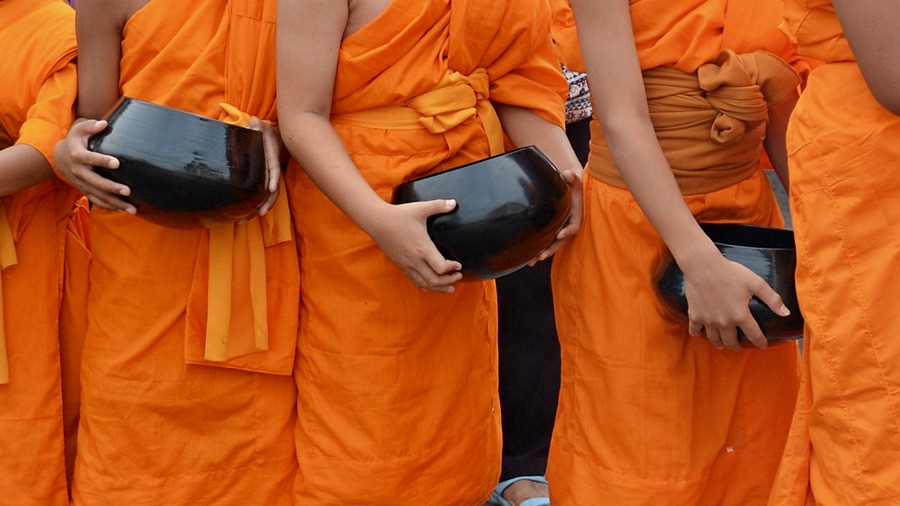“…Sāriputta, there are certain recluses and brahmins whose doctrine and view is this: ‘Purification comes about through food.’ They say: ‘Let us live on kola-fruits,’ and they eat kola-fruits, they eat kola-fruit powder, they drink kola-fruit water, and they make many kinds of kola-fruit concoctions. Now I recall having eaten a single kola-fruit a day. Sāriputta, you may think that the kola-fruit was bigger at that time, yet you should not regard it so: the kola-fruit was then at most the same size as now. Through feeding on a single kola-fruit a day, my body reached a state of extreme emaciation. Because of eating so little my limbs became like the jointed segments of vine stems or bamboo stems. Because of eating so little my backside became like a camel’s hoof. Because of eating so little the projections on my spine stood forth like corded beads. Because of eating so little my ribs jutted out as gaunt as the crazy rafters of an old roof-less barn. Because of eating so little the gleam of my eyes sank far down in their sockets, looking like a gleam of water that has sunk far down in a deep well. Because of eating so little my scalp shrivelled and withered as a green bitter gourd shrivels and withers in the wind and sun. Because of eating so little my belly skin adhered to my backbone; thus if I wanted to touch my belly skin I encountered my backbone, and if I wanted to touch my backbone I encountered my belly skin. Because of eating so little, if I wanted to defecate or urinate, I fell over on my face right there. Because of eating so little, if I tried to ease my body by rubbing my limbs with my hands, the hair, rotted at its roots, fell from my body as I rubbed.
“Sāriputta, there are certain recluses and brahmins whose doctrine and view is this: ‘Purification comes about through food.’ They say: ‘Let us live on beans,’…‘Let us live on sesamum,’…‘Let us live on rice,’ and they eat rice, they eat rice powder, they drink rice water, and they make many kinds of rice concoctions. Now I recall having eaten a single rice grain a day. Sāriputta, you may think that the rice grain was bigger at that time, yet you should not regard it so: the rice grain was then at most the same size as now. Through feeding on a single rice grain a day, my body reached a state of extreme emaciation. Because of eating so little…the hair, rotted at its roots, fell from my body as I rubbed.
“Yet, Sāriputta, by such conduct, by such practice, by such performance of austerities, I did not attain any superhuman states, any distinction in knowledge and vision worthy of the noble ones. Why was that? Because I did not attain that noble wisdom which when attained is noble and emancipating and leads the one who practises in accordance with it to the complete destruction of suffering.
“Sāriputta, there are certain recluses and brahmins whose doctrine and view is this: ‘Purification comes about through the round of rebirths.’ But it is not easy to find a realm in the round that I have not already passed through in this long journey, except for the gods of the Pure Abodes; and had I passed through the round as a god in the Pure Abodes, I would never have returned to this world.
“There are certain recluses and brahmins whose doctrine and view is this: ‘Purification comes about through some particular kind of rebirth.’ But it is not easy to find a kind of rebirth that I have not been reborn in already in this long journey, except for the gods of the Pure Abodes…
“There are certain recluses and brahmins whose doctrine and view is this: ‘Purification comes about through some particular abode.’ But it is not easy to find a kind of abode that I have not already dwelt in…except for the gods of the Pure Abodes…
“There are certain recluses and brahmins whose doctrine and view is this: ‘Purification comes about through sacrifice.’ But it is not easy to find a kind of sacrifice that has not already been offered up by me in this long journey, when I was either a head-anointed noble king or a well-to-do brahmin.
“There are certain recluses and brahmins whose doctrine and view is this: ‘Purification comes through fire-worship.’ But it is not easy to find a kind of fire that has not already been worshipped by me in this long journey, when I was either a head-anointed noble king or a well-to-do brahmin.
Read the complete translation of MN 12 Mahāsīhanādasutta: The Greater Discourse on the Lion’s Roar by Bhikkhu Bodhi on SuttaCentral.net. Or read a different translation on SuttaCentral.net by Bhikkhu Sujato, Bhikkhu Suddhāso, or on DhammaTalks.org.

All translations on this site by Bhikkhu Bodhi are licensed under a Creative Commons Attribution-NonCommercial-NoDerivs 3.0 Unported License.
Bhikkhu Bodhi, The Middle Length Discourses of the Buddha (Wisdom Publications, 2009), The Connected Discourses of the Buddha (Wisdom Publications, 2000), The Numerical Discourses of the Buddha (Wisdom Publications, 2012).



 Copyright: Creative Commons Zero (CC0) To the extent possible under law, Bhikkhu Sujato has waived all copyright and related or neighboring rights to his own translations on
Copyright: Creative Commons Zero (CC0) To the extent possible under law, Bhikkhu Sujato has waived all copyright and related or neighboring rights to his own translations on 
 All translations by Ānandajoti Bhikkhu are subject to the
All translations by Ānandajoti Bhikkhu are subject to the 
 All translations on this site by Bhikkhu Bodhi are licensed under a Creative Commons Attribution-NonCommercial-NoDerivs 3.0 Unported License.
Bhikkhu Bodhi, The Middle Length Discourses of the Buddha (Wisdom Publications, 2009), The Connected Discourses of the Buddha (Wisdom Publications, 2000), The Numerical Discourses of the Buddha (Wisdom Publications, 2012).
All translations on this site by Bhikkhu Bodhi are licensed under a Creative Commons Attribution-NonCommercial-NoDerivs 3.0 Unported License.
Bhikkhu Bodhi, The Middle Length Discourses of the Buddha (Wisdom Publications, 2009), The Connected Discourses of the Buddha (Wisdom Publications, 2000), The Numerical Discourses of the Buddha (Wisdom Publications, 2012).
 Translations by Bhikkhu Ṭhanissaro are released under the Creative Commons Attribution-NonCommercial 4.0 Unported License. The author considers any sale, including by non-profit entities for non-profit purposes, to be ‘Commercial’ and a copyright violation. To view a copy of this license, visit the
Translations by Bhikkhu Ṭhanissaro are released under the Creative Commons Attribution-NonCommercial 4.0 Unported License. The author considers any sale, including by non-profit entities for non-profit purposes, to be ‘Commercial’ and a copyright violation. To view a copy of this license, visit the 
